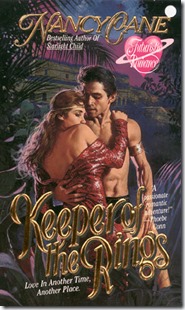As a beginning writer, I didn’t understand what it meant to stay in viewpoint. I was guilty of bouncing heads, or switching viewpoints within the same scene. This confuses readers because they become unsure of who is the main character. You should stay within one person’s head or else use a space break to delineate a change.
Books in the thriller genre often use multiple viewpoints, a technique that can work as long as there’s one clearly identifiable hero. If not, your reader isn’t going to care about any of the characters. Sure, you can catch their interest using bait and switch tactics. This means, you leave off each scene with one person in jeopardy before switching viewpoints with a space or chapter break. But get inside too many different heads, and the reader will cease to care. Maybe this is why I like single third-person or first person viewpoint in the mysteries I read. In a romance, it’s standard to alternate the hero and heroine’s viewpoint and sometimes this includes the villain as well. That’s okay as long as the character switch is well marked.

In revising Keeper of the Rings, one of my earlier romances that I wrote originally as Nancy Cane, I caught a perfect example of changing viewpoints in the same scene. Here’s an example:
[B’s viewpoint] Wellis, the village priest, had requested Bendyk’s presence. Now, as he sat across from the older man in the living room of his oceanfront bungalow, Bendyk fingered the medallion hanging from his neck.
“I fail to understand your meaning when you say people are straying from the Faith.” He squared his shoulders. “The turnout at the service this morning was phenomenal.”
“That’s because the villeins are putting on a pretense of piety for your benefit.” Wellis wagged his finger. “They’re afraid you’ll report to the Docent about their indiscretions.”
[W’s viewpoint] Pursing his lips, Wellis felt he should know his flock better than any representative from the central authority, such as Bendyk Worthington-Jax. He’d sent for help, realizing the situation could get out of control. After all, on whose head would the wrath of Lothar fall if he failed? His own, of course. But the golden-haired missionary, despite his zeal, had found nothing amiss.
It wasn’t Bendyk’s fault, considering how fearful the villeins were about retribution. The blasphemous talk circulating throughout the town was bound to bring dire repercussions. Wellis had hoped Bendyk would inspire a renewal of faith and, indeed, the service he’d conducted this morning had been exemplary. Perhaps his visit had done some good after all.
Bendyk faced him across a table laden with fresh fruit and nuts. The young man quirked an eyebrow. “Don’t forget it’s tithing time. The tax collector is here, even in the midst of Renewal celebrations. That’s enough cause for heightened tension.”
Wellis gave him a weary smile. “Not in this case. We’ve been fortunate to have the same agent each year. She counts in our favor and exacts a toll of ten percent on less the amount actually produced.”
Bendyk’s eyes darkened to a shade of indigo. “You mean this agent reports an inaccurate count? Why, that’s a criminal offense.”
Wellis leaned back in his chair, relishing the warm salty breeze blowing in from the open windows. His bungalow, a short distance from the ocean, stood on stilts like the rest of the houses by the shore. Further inland, other dwellings rose along a gentle slope that footed the Jerrise mountain range.
His congregation enjoyed a simple life living off the bounty of the sea and their industries of ropemaking and small boat construction. No one had enough revenue to fuel an investigation, so he didn’t see any harm in telling Bendyk of the tax agent’s favoritism.
“It appeases people,” he said with a shrug. “There’s enough grumbling about laws that don’t take into account the needs of individual districts.”
Bendyk scraped a hand through his short, wavy hair. “That’s not true. The Docents are responsible for making adjustments. If they rule unfairly, you can appeal to the Candor.”
“The Candors are concerned mainly with their own wealth. Things have gotten out of hand.”
Bendyk shot to his feet. “My father is a Candor. He’s always judged his people fairly and considered their needs.”
[B’s viewpoint – we can’t see if our own eyes look shrewd] Wellis regarded him with shrewd eyes. “Cranby is an exception. Do you deny that dissatisfaction with the Synod’s power is growing? Aren’t your services widely in demand in an attempt by local priests, like myself, to stem this tide of disloyalty?”
[W’s viewpoint] “It is the work of the Truthsayers.” Bendyk’s jaw clenched. “They seek to undermine the Faith and establish anarchy in its place.”
Footsteps sloshed outside, and Wellis held up a hand to silence his guest. “Hush, here comes the village council. I have summoned them to hear your advice. Go easy, young man. Your fiery tongue does you well in sermons but not in debate.”
I decided this scene should be told from Bendyk’s viewpoint since he’s a major player in the story. So here’s the new scene. See if it flows better and keeps your interest more.
Wellis, the village priest, had requested a private audience with him. Now, as he sat across from the older man in the living room of his oceanfront bungalow, Bendyk fingered the medallion hanging from his neck.
“I fail to understand your meaning when you say people are straying from the Faith,” he said. “The turnout at the service this morning was phenomenal.”
Wellis wagged his finger. “That’s because the villeins are putting on a pretense of piety for your benefit. They’re afraid you’ll report their indiscretions to the Docent.”
Bendyk tightened his lips. No doubt Wellis felt he knew his flock better than any representative from the central authority. But the priest had sent for help, realizing the situation there could get out of control. After all, on whose head would the wrath of Lothar fall if he failed? Yet the blasphemous talk circulating through town wasn’t evident during Bendyk’s inspection. He wasn’t surprised, considering how fearful the villeins were about retribution.
Wellis had hoped his arrival might inspire a renewal of faith. In truth, the service Bendyk had conducted this morning had been exemplary. Perhaps his visit had done some good after all.
He faced the priest across a table laden with fresh fruit and nuts. “Don’t forget it’s tithing time. The tax collector is here, even in the midst of Renewal celebrations. That’s enough cause for heightened tension.”
Wellis gave him a weary smile. “Not in this case. We’ve been fortunate to have the same agent each year. She counts in our favor and exacts a toll on ten percent less than the amount actually produced.”
“You mean, this agent reports an inaccurate count? Why, that’s a criminal offense.”
Wellis leaned back in his chair, while a warm salty breeze swept in through open windows. His bungalow, a short distance from the ocean, stood on stilts like the rest of the houses by the shore. Further inland, other dwellings rose along a gentle slope that footed the Jerrise mountain range.
“It appeases people,” Wellis said with a shrug. “I hear grumblings about laws that don’t take into account the needs of individual districts. My people enjoy a simple life. They live off the bounty of the sea, plus their industries of rope-making and small boat building. No one earns enough revenue to warrant an investigation.”
“That’s not true. The Docents are responsible for making adjustments. If they rule unfairly, you can appeal to the Candor.”
“The Candors are concerned mainly with their own wealth. Things have gotten out of hand.”
Bendyk shot to his feet. “My father is a Candor. He’s always judged people fairly and considered their needs.”
“Cranby is an exception.” Wellis regarded him with shrewd eyes. “Do you deny that dissatisfaction with the Synod’s power is growing? Aren’t your services widely in demand in an attempt by local priests, like myself, to stem this tide of disloyalty?”
“It is the work of Truthsayers. They want to undermine our Faith and establish anarchy in its place.”
Footsteps sloshed outside, and Wellis held up a hand to silence his guest. “Hush, here comes the village council. I have summoned them to hear your advice. Go easy, young man. Your fiery tongue does you well in sermons but not in debate.”
You may have noticed that I polished up the prose as well. So what do you think? Were you better able to identify with Bendyk in the second sample?
GIVEAWAY
Enter Here to win a $25 Amazon/BN gift card from Booklover’s Bench.
















